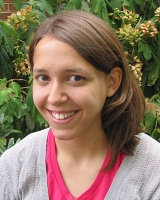2012 REU Program Participant Profiles: Sarah Bogen
 |
Major: Mathematics |
Why did you apply to the REU program?
I have been interested in REU programs since my freshman year when my undergraduate advisor first told me that they existed. I wanted to experience research full-time so that I would better know whether graduate school should be in my future. I was also interested in the challenges and benefits of interdisciplinary work, particularly when combining math and biology.
What is the purpose of your research?
Johne's disease is a bacterial infection that affects many ruminants, including dairy cows. The purpose of our research is to create an agent-based model (a model that tracks many individuals rather than treating a population as a whole) that simulates disease dynamics on a dairy farm and to use that model to answer questions about the effectiveness and cost efficiency of different testing and management strategies.
![]()
I have learned that math touches nearly every other aspect of the world and that having strong skills in the subject opens the door to many really awesome opportunities, particularly in interdisciplinary fields.
![]()
– Sarah Bogen, REU participant
What does the research ultimately accomplish? What contributions to science and/or humanity does the research ultimately make?
Premature loss of animals and decreased milk production due to Johne's disease is estimated to cost the US dairy industry over $200 million each year. For this reason, research like this could be very important to dairy farmers all over the world. Ultimately, results from our project and others like it could advise farmers of the best and most economic management practices when dealing with the disease.
Describe a typical day on the job:
My research group usually gets started by nine and finishes each day by five. While we are at work, we search for and read papers, brainstorm about model design, write and debug code in NetLogo, and run simulations. We usually take a break around noon to have lunch and go for a walk together. About twice a week, we meet with our mentors to discuss progress and plan the next steps in our project. Some mornings, all of the REU students come together for lectures, talks, or professional development activities.
Tell us something about your field we would be surprised to know.
People in the dairy industry have come up with some really interesting methods to keep their farms running smoothly. One farm we visited utilized pedometers to keep track of how much cows move each day. A decline in the amount of daily movement may be a red flag signaling illness or injury.
What were your favorite parts of the REU program?
I liked that the interdisciplinary nature of the program allowed me to learn a lot about things I probably wouldn't come across otherwise. I really enjoyed learning all about dairy cattle and farm management through reading, visits to dairy farms, and conversations with experts on the subject. I also liked taking advantage of opportunities I would have never had as an undergraduate otherwise. My group got to sit in on parts of NIMBioS's working group on Johne's disease, which was a neat experience because of the energy and expertise the members brought to the table.
What new experiences did you gain that have helped you today?
Coming to NIMBioS has made me more aware of the vast range of possibilities there are within mathematical biology as well as outside of it. I am a bit more clueless about my research interests now than I was before I came, which I’ve realized is not necessarily a bad thing. In a way, being uncertain is exciting because it means virtually anything is possible. All I have to do is be myself, work hard, and keep an open mind while exploring all the opportunities.
I attend a liberal arts school, and I have a lot of friends majoring in religion, international studies, education, social work, and nursing who dream of changing the world or dedicating their lives to helping other people. There was a stretch time when I felt insignificant for just sitting around and studying math. Getting involved with research has shown me how I can use my passion for my own field of study to have a positive impact.
A lot of people I’ve met in the past few years are surprised when I tell them that I used to consider math to be my weakness. The idea of taking calculus my senior year of high school simply scared me. Working incredibly hard in that class to avoid failure became the start of a career path toward mathematics. Since then, I have learned that math touches nearly every other aspect of the world and that having strong skills in the subject opens the door to many really awesome opportunities, particularly in interdisciplinary fields. I’ve also learned that if that door is closed, it doesn't have to be closed forever.
Would you recommend our program to others?
I would say to apply! It is really a great opportunity that is challenging but not overwhelming. It involves studying at a well-respected institute that hundreds of academics trek to each year and living in an absolutely beautiful part of the United States. I will definitely take what I’ve learned this summer forward with me, and I will be able to look back on many unique memories.
NIMBioS
1122 Volunteer Blvd., Suite 106
University of Tennessee
Knoxville,
TN 37996-3410
PH: (865) 974-9334
FAX: (865) 974-9461
Contact NIMBioS


